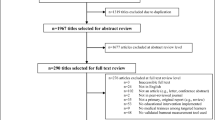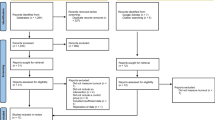Abstract
Objective
Little is known about the efficacy of current interventions to mitigate burnout among medical students and residents, despite its association with mood disorders, absenteeism, low job satisfaction, and medical errors. This review summarizes the efficacy data of burnout interventions and how each modality is used.
Method
OVID-SP Medline, Google Scholar and PsychINFO were searched for combinations of medical subject headings (MeSH) terms: premedical students, medical students, internships, intern, medical graduate, clinical clerkship, and residents in combination with a keyword group of burnout, professional burnout, suicide, attempted suicide, and prevention. Studies with data on the efficacy from burnout prevention programs were included for review.
Results
Nineteen studies were selected for inclusion in this review. Eleven different types of interventions and combinations of interventions were used. There were six studies on the impact of the 2003 duty-hour restrictions by the Accreditation Council for Graduate Medical Education on burnout. Other approaches included self-development groups, conversion to a pass-fail grading system and training in mindfulness, communication, and stress management. Half of the intervention approaches had at least one study demonstrating benefit in reducing burnout. Self-development groups, the Respiratory One Method for relaxation, and conversion to a pass-fail grading system appear to reduce burnout. The burnout data on mindfulness training and the 2003 resident duty-hour restrictions are mixed. There were no studies available on burnout among premedical students or suicide prevention among medical students or residents.
Conclusions
There is a growing body of evidence-based interventions to mitigate burnout which can be used in the development of future programs. More research is needed to identify and intervene against burnout earlier in the medical education pipeline, including at the undergraduate level.

Similar content being viewed by others
References
Shiralkar MT, Harris TB, Eddins-Folensbee FF, Coverdale JH. A systematic review of stress-management programs for medical students. Acad Psychiatry. 2013;37:158–64.
Dyrbye LN, Thomas MR, Massie FS, et al. Burnout and suicidal ideation among U.S. medical students. Ann Intern Med. 2008;149:334–41.
Netterstrøm B, Conrad N, Bech P, et al. The relation between work-related psychosocial factors and the development of depression. Epidemiol Rev. 2008;30:118–32.
Ahola K, Hakanen J. Job strain, burnout, and depressive symptoms: a prospective study among dentists. J Affect Disord. 2007;104:103–10.
Ahola K, Honkonen T, Kivimäki M, et al. Contribution of burnout to the association between job strain and depression: the health 2000 study. J Occup Environ Med. 2006;48:1023–30.
Siegrist J. Chronic psychosocial stress at work and risk of depression: evidence from prospective studies. Eur Arch Psychiatry Clin Neurosci. 2008;258:115–9.
Ghetti C, Chang J, Gosman G. Burnout, psychological skills, and empathy: balint training in obstetrics and gynecology residents. J Grad Med Educ. 2009;1:231–5.
Martini S, Arfken CL, Churchill A, Balon R. Burnout comparison among residents in different medical specialties. Acad Psychiatry. 2004;28:240–2.
Gelfand DV, Podnos YD, Carmichael JC, Saltzman DJ, Wilson SE, Williams RA. Effect of the 80-hour workweek on resident burnout. Arch Surg. 2004;139:933–8. discussion 8–40.
McCue JD, Sachs CL. A stress management workshop improves residents' coping skills. Arch Intern Med. 1991;151:2273–7.
Dyrbye LN, Thomas MR, Huntington JL, et al. Personal life events and medical student burnout: a multicenter study. Acad Med. 2006;81:374–84.
Dyrbye LN, Thomas MR, Huschka MM, et al. A multicenter study of burnout, depression, and quality of life in minority and nonminority US medical students. Mayo Clin Proc. 2006;81:1435–42.
Shanafelt TD, Bradley KA, Wipf JE, Back AL. Burnout and self-reported patient care in an internal medicine residency program. Ann Intern Med. 2002;136:358–67.
Ramirez AJ, Graham J, Richards MA, et al. Burnout and psychiatric disorder among cancer clinicians. Br J Cancer. 1995;71:1263–9.
Bellini LM, Baime M, Shea JA. Variation of mood and empathy during internship. JAMA. 2002;287:3143–6.
Lemkau JP, Purdy RR, Rafferty JP, Rudisill JR. Correlates of burnout among family practice residents. J Med Educ. 1988;63:682–91.
Chang E, Eddins-Folensbee F, Coverdale J. Survey of the prevalence of burnout, stress, depression, and the use of supports by medical students at one school. Acad Psychiatry. 2012;36:177–82.
Woodside JR, Miller MN, Floyd MR, McGowen KR, Pfortmiller DT. Observations on burnout in family medicine and psychiatry residents. Acad Psychiatry. 2008;32:13–9.
Maslach C, Jackson SE, Leiter MP. Maslach burnout inventory manual. 3 ed. Consulting Psychologists; 1996
Rafferty JP, Lemkau JP, Purdy RR, Rudisill JR. Validity of the Maslach Burnout Inventory for family practice physicians. J Clin Psychol. 1986;42:488–92.
Terry PC, Lane AM, Fogarty GJ. Construct validity of the profile of mood states—adolescents for use with adults. Psychol Sport Exerc. 2003;4:125–39.
Dyrbye LN, Szydlo DW, Downing SM, Sloan JA, Shanafelt TD. Development and preliminary psychometric properties of a well-being index for medical students. BMC Med Educ. 2010;10:8.
Westerman M, Fokkema JP, Teunissen PW. The need for a uniform use of the construct of burnout. Acad Med. 2011;86:661.
Dyrbye LN, Thomas MR, Shanafelt TD. Systematic review of depression, anxiety, and other indicators of psychological distress among U.S. and Canadian medical students. Acad Med. 2006;81:354–73.
Thompson D, Goebert D, Takeshita J. A program for reducing depressive symptoms and suicidal ideation in medical students. Acad Med. 2010;85:1635–9.
Holm M, Tyssen R, Stordal KI, Haver B. Self-development groups reduce medical school stress: a controlled intervention study. BMC Med Educ. 2010;10:23.
Gopal R, Glasheen JJ, Miyoshi TJ, Prochazka AV. Burnout and internal medicine resident work-hour restrictions. Arch Intern Med. 2005;165:2595–600.
Barrack RL, Miller LS, Sotile WM, Sotile MO, Rubash HE. Effect of duty hour standards on burnout among orthopaedic surgery residents. Clin Orthop Relat Res. 2006;449:134–7.
Rosenzweig S, Reibel DK, Greeson JM, Brainard GC, Hojat M. Mindfulness-based stress reduction lowers psychological distress in medical students. Teach Learn Med. 2003;15:88–92.
Hutter MM, Kellogg KC, Ferguson CM, Abbott WM, Warshaw AL. The impact of the 80-hour resident workweek on surgical residents and attending surgeons. Ann Surg. 2006;243:864–71. discussion 71–5.
Goitein L, Shanafelt TD, Wipf JE, Slatore CG, Back AL. The effects of work-hour limitations on resident well-being, patient care, and education in an internal medicine residency program. Arch Intern Med. 2005;165:2601–6.
Lieberman III JA, Stuart MR. The BATHE method: incorporating counseling and psychotherapy into the everyday management of patients. Prim Care Companion J Clin Psychiatry. 1999;1:35–8.
Rohe DE, Barrier PA, Clark MM, Cook DA, Vickers KS, Decker PA. The benefits of pass-fail grading on stress, mood, and group cohesion in medical students. Mayo Clin Proc. 2006;81:1443–8.
Clara IP, Cox BJ, Enns MW. Confirmatory factor analysis of the Depression–Anxiety–Stress Scales in depressed and anxious patients. J Psychopathol Behav Assess. 2001;23:61–7.
Reed DA, Shanafelt TD, Satele DW, et al. Relationship of pass/fail grading and curriculum structure with well-being among preclinical medical students: a multi-institutional study. Acad Med. 2011;86:1367–73.
Bandura A. Self-efficacy. In: Ramachaudran VS, editor. Encyclopedia of human behavior. New York: Academic; 1994. p. 71–81.
Ospina-Kammerer V, Figley CR. An evaluation of the Respiratory One Method (ROM) in reducing emotional exhaustion among family physician residents. Int J Emerg Ment Health. 2003;5:29–32.
Milstein JM, Gerstenberger AE, Barton S. Healing the caregiver. J Altern Complement Med. 2002;8:917–20.
Finkelstein C, Brownstein A, Scott C, Lan YL. Anxiety and stress reduction in medical education: an intervention. Med Educ. 2007;41:258–64.
Bragard I, Etienne AM, Merckaert I, Libert Y, Razavi D. Efficacy of a communication and stress management training on medical residents' self-efficacy, stress to communicate and burnout: a randomized controlled study. J Health Psychol. 2010;15:1075–81.
Warnecke E, Quinn S, Ogden K, Towle N, Nelson MR. A randomised controlled trial of the effects of mindfulness practice on medical student stress levels. Med Educ. 2011;45:381–8.
About The Center for Mind-Body Medicine. Center for Mind-Body Medicine, 2012. http://cmbm.org . Accessed 26 Apr 2012.
Sikora R, Mongold B, Sedgeman J, Davis SM. 122: Burnout in Emergency Medicine residents and faculty: an attempt to modify stress response by journaling. Ann Emerg Med. 2008;51:508.
Disclosures
On behalf of all the authors, the corresponding author states that there is no conflict of interest.
Author information
Authors and Affiliations
Corresponding author
Rights and permissions
About this article
Cite this article
Williams, D., Tricomi, G., Gupta, J. et al. Efficacy of Burnout Interventions in the Medical Education Pipeline. Acad Psychiatry 39, 47–54 (2015). https://doi.org/10.1007/s40596-014-0197-5
Received:
Accepted:
Published:
Issue Date:
DOI: https://doi.org/10.1007/s40596-014-0197-5




